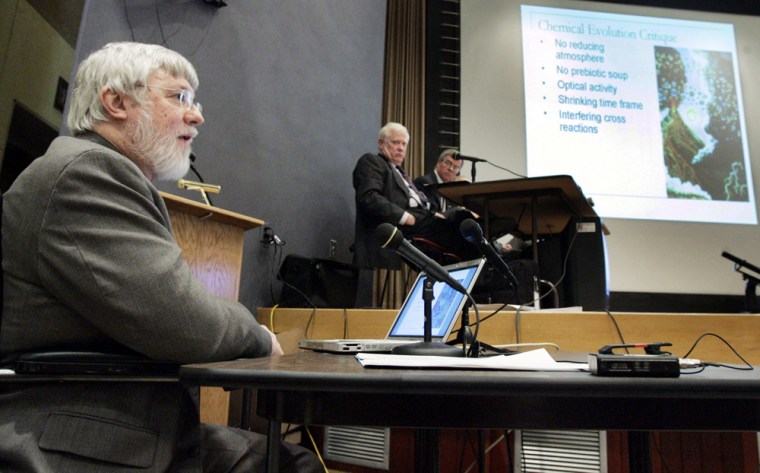Critics of evolutionary theory debated how schools should address questions about life's origins on Thursday, the first day of hearings that some have compared to the famed "Monkey Trial" in 1925.
Mainstream science organizations boycotted the trial-like hearings, conducted by a subcommittee of Kansas' State Board of Education. But a lawyer selected by the state's education department stepped in to represent the mainstream scientific point of view and question witnesses.
Critics of evolutionary theory, as well as advocates of an alternate view called intelligent design, were slated to provide testimony during the four days of subcommittee hearings.
The entire board plans to consider changes in June to standards that determine how Kansas students are tested on science. Last year's elections gave religious conservatives a majority on the 10-member board.
All conservative Republicans
The three board members presiding over the hearings are all conservative Republicans and receptive to criticism of evolution. Two of them, Kathy Martin and Connie Morris, agreed several times with witnesses critical of evolution.
"I was hoping this hearing would give me good, hard evidence that I could repeat," Morris said.
There were no protests, but over the lunch hour, the Kansas Highway Patrol brought in metal detectors for use outside the auditorium where the hearings were held. Lt. John Eichkorn said the patrol wasn't responding to a specific threat. "We're constantly re-evaluating our security needs," he said.
The board has sought to avoid comparisons of its hearings with the 1925 Scopes Monkey Trial in Dayton, Tenn., in which a teacher was convicted of violating a law against teaching evolution. But the hearings resemble a trial, with attorneys managing each side's case.
In 1925, attorney Clarence Darrow, representing teacher John Scopes, attempted to make creationism look foolish. In the Kansas hearings, evolution is under attack.
"This is the Scopes Trial turned on its head," said Bruce Chapman, president of the Seattle-based Discovery Institute, which has lent support to critics of evolutionary theory.
Even before the hearing began, Pedro Irigonegaray, the Topeka attorney designated to represent the mainstream scientific view, dismissed the event as a "kangaroo court."
Susan Gibbs, a mother of two teenagers who attended the hearings, wasn't sure her thinking about evolution would change because of the testimony. "I believe in God, but I'm not sure he created everything," she said during a break. "I'm right in the middle."
Two competing proposals
Last year, the board asked a committee of educators to recommend changes but eventually received two competing proposals. One, the majority plan, would continue the existing policy of treating evolution as a key concept for students to learn. The other, the minority plan, suggests more criticism of evolution.
Evolution says that species change over time and that such changes can lead to new species. Thus, different species, ranging from humans to monkeys to mice, branched out from common ancestors over the course of many millions of years. Intelligent design says some features of the natural world, because of their well-ordered complexities, are best explained by referring to the workings of an intelligent being.
Some science groups and many scientists contend the board is being pushed to adopt language that would enshrine tenets of intelligent design in the standards — even if that concept isn't mentioned by name. But intelligent design advocates say that's not true and argue that they're only trying to give students a more balanced view of evolution.
"Public science education is an institution," Harris testified. "It appoints a teacher to be a referee among ideas ... Nobody would tolerate a football game where the referee was obviously biased."
Is criticism really stifled?
Irigonegaray repeatedly attacked Harris' assertion that the majority's proposed standards stifle criticism of evolution in the classroom.
Irigonegaray asked him, referring to the majority proposal: "Where in the standards does it say teachers and students cannot discuss criticism of evolution?"
Harris replied: "It doesn't say that. I think it's implicit."
Charles Thaxton, who lives near Atlanta but is a visiting assistant professor of chemistry at the Charles University in the Czech Republic, presented another criticism of evolution. He testified that there's no evidence that life formed from a primordial soup.
The "primordial soup" issue often comes up in the debate over teaching evolution, but scientific theorists have pointed out that evolutionary theory focuses on biological change over time rather than the chemical origins of life. During the hearing, Irigonegaray asked Thaxton whether he accepted the theory that humans and apes had a common ancestor.
"Personally, I do not," Thaxton said. "I'm not an expert on this. I don't study this."
Minority report
Later in the day, Jonathan Wells, senior fellow at the Discovery Institute, concentrated on raising questions about evolution as it developed from the work of 19th-century British scientist Charles Darwin. Wells said that molecular biology, the study of animal and human embryos and the fossil record conflict with evolutionary claims.
Irigonegaray asked Wells whether only a minority of scientists agreed with his views about evolution. Wells acknowledged that was true.
"I enjoy being in the minority," Wells said.
Irigonegaray replied, "More than being right?"
Wells answered: "I prefer to be right. If that means I'm in the minority, then so be it."
Wells also acknowledged that he has been a member of the Rev. Sun Myung Moon's Unification Church since the 1970s.
"It's a typical ploy of my critics," Wells said later. "A person's religious affiliation is irrelevant in this."
Instead of testifying at the first hearing, representatives of national and state science groups held the first of a planned series of news conferences at the Statehouse. On display Thursday night was a wheelbarrow and two crates full of copies of scientific journals — to suggest evolution is well-documented.
“The only way we can make our point is to stop playing their game,” said Harry McDonald, president of Kansas Citizens for Science.
